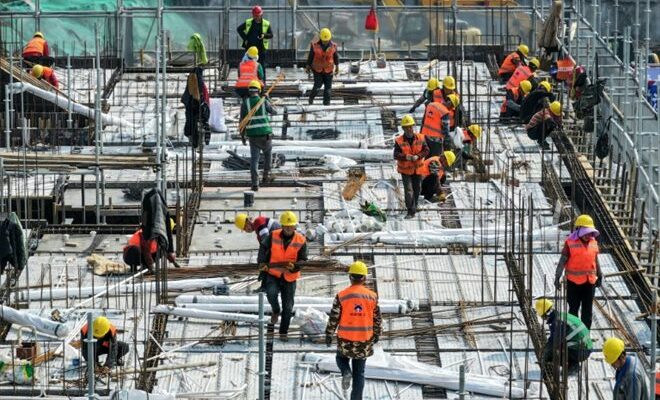Chinese Minister of Human Resources and Social Security, Wang Xiaoping, during a press conference, March 9, 2024 in Beijing (AFP/GREG BAKER)
China must do more to revive employment and stabilize its real estate market, several ministers recognized on Saturday, while the world’s second largest economy has struggled to restart since the Covid years.
The Asian giant faces a deep real estate crisis and record youth unemployment, while the global slowdown affects demand for Chinese products.
“The overall pressure on employment has not diminished and there are still structural contradictions to be resolved,” admitted Saturday Wang Xiaoping, Minister of Human Resources and Social Security, during a press conference on the sidelines of the annual parliamentary session.

Chinese students take part in a job fair in Wuhan, Hubei province, March 6, 2024 (AFP/STR)
“A portion of workers are facing employment challenges and problems, and more efforts need to be made to stabilize employment,” she added.
But Beijing is “confident in maintaining continued employment growth,” assured the minister.
Youth unemployment reached a record rate of 21.3% in mid-2023, before the authorities decided to change the method of calculating this statistic. The new revised rate, published at the end of the year, is around 15%.
Housing prices have been falling for months and several real estate developers, over-indebted, are fighting for their survival.
Real estate, which had experienced two decades of meteoric growth with the rise in the population’s standard of living, has long represented in the broad sense more than a quarter of China’s GDP.

Chinese Housing Minister Ni Hong during a press conference on March 9, 2024 in Beijing (AFP/GREG BAKER)
“The task of stabilizing the market is still very difficult,” Housing Minister Ni Hong said at the same press conference on Saturday.
Referring to “severely insolvent” real estate developers, he said that “those who need to go bankrupt must do so, and those who need to be restructured must be.”
To try to revive activity, the government has increased incentive measures and reassuring announcements in recent months, but the results have so far had little effect.
However, Beijing has managed to avoid “systemic risks” in the real estate sector, assured the minister.

Workers at a construction site in Nanjing, in the Chinese province of Jiangsu, March 7, 2024 (AFP/STR)
The annual parliamentary session, which ends on Monday, was an opportunity for Chinese leaders to unveil the growth target for 2024, set at around 5%.
This goal is a far cry from the double-digit rates recorded in the 1990s and 2000s.
But “it will not be easy to achieve,” acknowledged Prime Minister Li Qiang.
© 2024 AFP
Did you like this article ? Share it with your friends using the buttons below.




